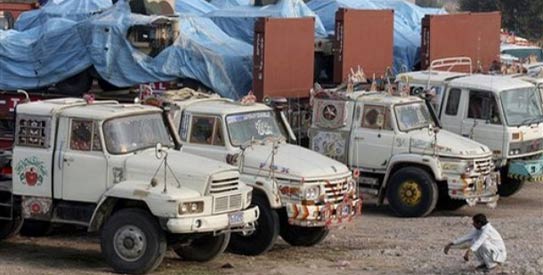
KARACHI: The decision to block supplies for Nato forces has brought a knotty problem for an unlikely quarter --- the country’s two sea ports --- since supplies ordered before the Mohmand air strikes have been reaching the Karachi and Bin Qasim ports anyway.
Four container ships and two vehicle carriers have unloaded around 2,000 boxes and 1,200 military vehicles since late last month, clogging the container terminals.
Already over 600 trucks loaded with containers and oil tankers which were on way to Afghanistan through Torkham and Chaman before the imposition of the embargo are stranded there because they were not allowed by security forces to cross the border.
Port users told Dawn that if the large number of Nato containers were not removed from the two ports soon, there will hardly be any space left for movement of commercial cargo, badly affecting the country’s imports and exports.
Terminal operators wondered who would pay the demurrage, plugging and other charges in case of any change in the government’s blockade decision. According to official documents, three container carriers belonging to American President Line (APL), an official carrier of US military hardware and equipment, called at country’s ports during the past 15 days.
Another container carrier was expected to call any time and may be given berth at the Karachi port.
Shipping sources said a large number of reefer containers (meant to keep perishable goods fresh) are also clogging the terminals and clocking phenomenal plugging charges.
“Since ports are transit points, and not meant for storage, the government should immediately arrange the removal of these containers from ports so that the movement of commercial cargo does not suffer,” a terminal operator told Dawn.
According to shipping sources, one day before the transit facility for US-led forces was withdrawn by the government after the Nov 26 attacks, a vehicle carrier, Alliance Charston, unloaded 400 military vehicles belonging to the US army. On a second trip the same carrier brought 800 military vehicles.
The other container carriers which reported during this period are Liberty Promise and President Jackson, which called on Nov 29, and President Truman (Dec 7).
According to the manifest, these ships mostly carried military hardware, spares, vehicles and foodstuffs.
Shipping sources told Dawn that altogether, containers worth 950 TEUs (twenty feet equivalents) and around 500 boxes are occupying a substantial space in the two ports.
On an average the allied forces stationed in Afghanistan import around 150,000TEUs per annum of goods. The cargo includes military hardware, spares, vehicles, food and perishable consumer goods.















































Dear visitor, the comments section is undergoing an overhaul and will return soon.